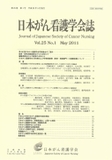Japanese
English
- 販売していません
- Abstract 文献概要
- 参考文献 Reference
要旨
〈背景〉わが国ではがん患者が増加する一方,患者の早期退院への移行から,在宅療養する終末期がん患者が増えている.しかし,家族介護者の疲労と不安の高まりなどから患者の在宅療養が困難となる現状があるにもかかわらず,終末期がん患者の在宅療養において家族介護者が体験する困難の詳細は明らかにされていない.
〈目的〉遺族,在宅医療・福祉関係者へのインタビュー調査により,終末期がん患者の在宅療養において家族介護者が体験した困難の詳細を明らかにする.
〈方法〉在宅ケアを受けていた終末期がん患者の遺族と在宅医療・福祉関係者12名を対象に半構造化面接を行った.
〈結果〉終末期がん患者の在宅療養において家族介護者が体験する困難は2つの側面から成り立ち,15カテゴリーに整理された.〈患者と家族介護者との関わりの側面〉として【患者の身体症状や苦痛に十分に対応ができない】,【スピリチュアルペインを感じる】,【介護の生活での苦労が大きい】,【介護に関する心理的な負担を強いられる】,【介護に関する身体的な負担を強いられる】,【介護と仕事のバランスが取れず仕事を犠牲にせざるをえない】,【介護者と親族の関係に不調和が生じる】の7カテゴリーが,〈在宅医療・サービスに関する側面〉として【安心した療養生活を開始できない状況にある】,【病院の医師との信頼関係が築かれない】,【往診医との良好な関係が築かれない】,【往診医の不十分な対応から安心した療養生活が送れない】,【訪問看護師との良好な関係が築かれない】,【ヘルパーを利用することで療養生活に不満や戸惑いを抱く】,【不十分な在宅サービスから望ましい療養生活が送れない】,【看取り後の葬儀について予期的に不安を抱く】の8カテゴリーが抽出された.
〈結論〉終末期がん患者の在宅療養において家族介護者が体験する困難の内容が明らかになった.この結果をもとに,在宅医療・福祉関係者が終末期がん患者の家族介護者への必要なケアを提供する際のアセスメントにつながると考える.
Abstract
Context: In Japan the incidence of many types of cancer is increasing and due to earlier discharges from the hospital, homecare needs are also increasing. End-of-life homecare is a recent trend; cancer patients may feel very burdened knowing their families are exhausted and anxious attempting to provide their homecare. However, there is no research about what types of difficulties the family caregivers have in managing patients at home.
Objective: The purpose of this study was to identify the difficulties encountering family caregivers in providing home-based terminal care for cancer patients.
Methods: Semi-structured interviews were conducted with seven family caregivers and five homecare providers(N=12)to identify the difficulties providing home care. Data were analyzed quantitatively using content analysis.
Results: The difficulties for caregivers consisted of two aspects and 15 categories. The first aspect regarded the relationship between patients and family; seven categories were identified:(1)difficulty managing symptoms and pain;(2)experiencing family's spiritual pain;(3)increasing caregiver burden;(4)caregiver's psychological burden;(5)caregiver's physical burden;(6)disruption of balance between caregiving and work and(7)relationship disharmony between caregiver and relatives. The second aspect regarded homecare providers and services ; eight categories were identified as difficulties with:(1)beginning homecare in a way that the patient feels relief; ;(2)creating a committed relationship with hospital-based doctor:(3)creating a good relationship with homebased doctor;(4)receiving sufficient support by home-based doctor;(5)creating a good relationship with home-visiting nurse;(6)complaints and confusion by home-helper:(7)receiving good home services and(8)anxiety about patient's funeral.
Conclusion: This study identified the difficulties facing family caregivers while providing homebased terminal care of cancer patients. The findings are useful for home-care providers to assess care needs for family caregivers who care for the cancer patient at the end of life.
Copyright © 2011, Japanese Society of Cancer Nursing All rights reserved.


